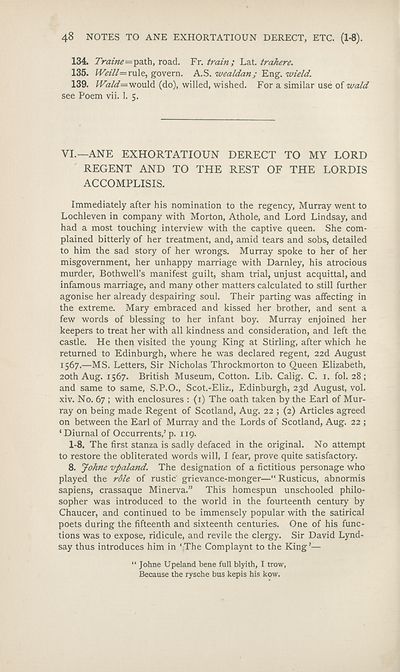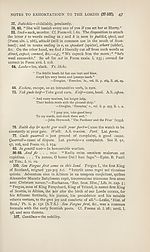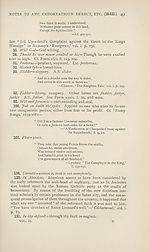Scottish Text Society publications > Old series > Satirical poems of the time of the reformation > Volume 2, 1893
(64)
Download files
Complete book:
Individual page:
Thumbnail gallery: Grid view | List view

48 NOTES TO ANE EXHORTATIOUN DERECT, ETC. (1-8).
134. Traine=pa.th, road. Fr. train; Lat. trahere.
135. JF(?z7/=rule, govern. A.S. wealdan; Eng. wield.
139. £F<2/<7=would (do), willed, wished. For a similar use of
see Poem vii. 1. 5.
VI.—ANE EXHORTATIOUN DERECT TO MY LORD
REGENT AND TO THE REST OF THE LORDIS
ACCOMPLISIS.
Immediately after his nomination to the regency, Murray went to
Lochleven in company with Morton, Athole, and Lord Lindsay, and
had a most touching interview with the captive queen. She com¬
plained bitterly of her treatment, and, amid tears and sobs, detailed
to him the sad story of her wrongs. Murray spoke to her of her
misgovernment, her unhappy marriage with Darnley, his atrocious
murder, Bothwell’s manifest guilt, sham trial, unjust acquittal, and
infamous marriage, and many other matters calculated to still further
agonise her already despairing soul. Their parting was affecting in
the extreme. Mary embraced and kissed her brother, and sent a
few words of blessing to her infant boy. Murray enjoined her
keepers to treat her with all kindness and consideration, and left the
castle. He then visited the young King at Stirling, after which he
returned to Edinburgh, where he was declared regent, 22d August
1567.—MS. Letters, Sir Nicholas Throckmorton to Queen Elizabeth,
20th Aug. 1567. British Museum, Cotton. Lib. Calig. C. 1. fol. 28;
and same to same, S.P.O., Scot.-Eliz., Edinburgh, 23d August, vol.
xiv. No. 67 ; with enclosures : (1) The oath taken by the Earl of Mur¬
ray on being made Regent of Scotland, Aug. 22 ; (2) Articles agreed
on between the Earl of Murray and the Lords of Scotland, Aug. 22 ;
‘Diurnal of Occurrents,’ p. 119.
1-8. The first stanza is sadly defaced in the original. No attempt
to restore the obliterated words will, I fear, prove quite satisfactory.
8. Johne vpaland. The designation of a fictitious personage who
played the rdle of rustic grievance-monger—“ Rusticus, abnormis
sapiens, crassaque Minerva.” This homespun unschooled philo¬
sopher was introduced to the world in the fourteenth century by
Chaucer, and continued to be immensely popular with the satirical
poets during the fifteenth and sixteenth centuries. One of his func¬
tions was to expose, ridicule, and revile the clergy. Sir David Lynd-
say thus introduces him in ‘The Complaynt to the King’—
“ Johne Upeland bene full blyith, I trow,
Because the rysche bus kepis his kow.
134. Traine=pa.th, road. Fr. train; Lat. trahere.
135. JF(?z7/=rule, govern. A.S. wealdan; Eng. wield.
139. £F<2/<7=would (do), willed, wished. For a similar use of
see Poem vii. 1. 5.
VI.—ANE EXHORTATIOUN DERECT TO MY LORD
REGENT AND TO THE REST OF THE LORDIS
ACCOMPLISIS.
Immediately after his nomination to the regency, Murray went to
Lochleven in company with Morton, Athole, and Lord Lindsay, and
had a most touching interview with the captive queen. She com¬
plained bitterly of her treatment, and, amid tears and sobs, detailed
to him the sad story of her wrongs. Murray spoke to her of her
misgovernment, her unhappy marriage with Darnley, his atrocious
murder, Bothwell’s manifest guilt, sham trial, unjust acquittal, and
infamous marriage, and many other matters calculated to still further
agonise her already despairing soul. Their parting was affecting in
the extreme. Mary embraced and kissed her brother, and sent a
few words of blessing to her infant boy. Murray enjoined her
keepers to treat her with all kindness and consideration, and left the
castle. He then visited the young King at Stirling, after which he
returned to Edinburgh, where he was declared regent, 22d August
1567.—MS. Letters, Sir Nicholas Throckmorton to Queen Elizabeth,
20th Aug. 1567. British Museum, Cotton. Lib. Calig. C. 1. fol. 28;
and same to same, S.P.O., Scot.-Eliz., Edinburgh, 23d August, vol.
xiv. No. 67 ; with enclosures : (1) The oath taken by the Earl of Mur¬
ray on being made Regent of Scotland, Aug. 22 ; (2) Articles agreed
on between the Earl of Murray and the Lords of Scotland, Aug. 22 ;
‘Diurnal of Occurrents,’ p. 119.
1-8. The first stanza is sadly defaced in the original. No attempt
to restore the obliterated words will, I fear, prove quite satisfactory.
8. Johne vpaland. The designation of a fictitious personage who
played the rdle of rustic grievance-monger—“ Rusticus, abnormis
sapiens, crassaque Minerva.” This homespun unschooled philo¬
sopher was introduced to the world in the fourteenth century by
Chaucer, and continued to be immensely popular with the satirical
poets during the fifteenth and sixteenth centuries. One of his func¬
tions was to expose, ridicule, and revile the clergy. Sir David Lynd-
say thus introduces him in ‘The Complaynt to the King’—
“ Johne Upeland bene full blyith, I trow,
Because the rysche bus kepis his kow.
Set display mode to: Large image | Zoom image | Transcription
Images and transcriptions on this page, including medium image downloads, may be used under the Creative Commons Attribution 4.0 International Licence unless otherwise stated. ![]()
| Publications by Scottish clubs > Scottish Text Society publications > Old series > Satirical poems of the time of the reformation > Volume 2, 1893 > (64) |
|---|
| Permanent URL | https://digital.nls.uk/107427527 |
|---|
| Attribution and copyright: |
|
|---|
| Description | A collection of over 100 Scottish texts dating from around 1400 to 1700. Most titles are in Scots, and include editions of poetry, drama, and prose by major Scottish writers such as John Barbour, William Dunbar, Gavin Douglas, and George Buchanan. Edited by a key scholarly publisher of Scotland's literary history, and published from the late 19th century onwards by the Scottish Text Society. Available here are STS series 1-3. |
|---|

